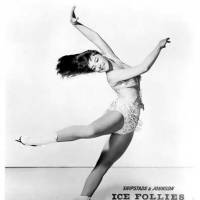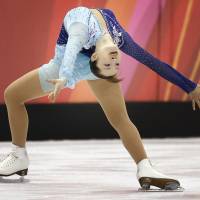A significant figure in the world of skating passed away earlier this month with nary a mention in the mainstream media. It was both sad and a reminder of how quickly history can be forgotten.
Her name is uttered by television announcers at least once at almost all major competitions, and it was made famous in Japan by the element associated with it when Shizuka Arakawa won the gold medal at the 2006 Turin Olympics.
Ina Bauer died in Germany at the age of 73 on Dec. 13. She was a three-time West German champion (1957-59) in singles, and finished fourth in the world championships twice (1958, '59). However, she was best known for a move which entails spreading the legs forward and back, opening the toes 180 degrees, and skating sideways.
Arakawa used a more extreme version of the element in her free skate in Turin in what is now referred to as a "lay back" Ina Bauer. There are many who feel this helped Arakawa clinch the gold, as she performed it directly in front of the judges, then followed it with a three-jump combination.
The Ina Bauer is commonly used as an entrance into jumps, and can be performed on either an inside or outside edge. It is frequently entered through an inside-edge "spread eagle."
The element is performed not only by female skaters, as Olympic and world champion Yuzuru Hanyu is using it in his free skate to "Phantom of the Opera" this season.
Though she only competed for four seasons (1956-59), Bauer left her mark before retiring. She joined the pantheon of skaters who have had a move named after them. They include Norwegian Axel Paulsen, Sweden's Ulrich Salchow, Austria's Alois Lutz and Switzerland's Denise Biellmann.
Bauer went on to star as a pro skater in the Ice Follies and made a pair of movies after her competitive career ended. She was known as "Brigitte Bardot on ice" for the combination of her beauty and skating skills during her time with the touring group in the United States.
In 2013, in a podcast on the Manleywoman skating site, 1960 Olympic gold medalist Carol Heiss Jenkins of the U.S. was asked who she was most nervous competing against during her career.
"Probably the German girl, Ina Bauer, because she came in with the Bauer and she had flaming red hair," replied Heiss Jenkins, who retired after winning her fifth straight world title in 1960.
Bauer was born on Jan. 31, 1941, in Krefeld, Germany. Her father was a silk manufacturer. She later married Hungarian skater Istvan Szenes.
Following the end of her pro career, Bauer was active as a coach and board member in her hometown at the Ice Sports Club Krefeld. In 1980, she founded the Ina Bauer Cup, an event which continues to this day at the club.
After Arakawa's victory in Turin, which along with the emergence of prodigy Mao Asada helped launch a skating boom in Japan, the term "Ina Bauer" became very popular in this country.
Some tried to capitalize on Arakawa's success, including Asahi Breweries Ltd. The beer maker filed a trademark patent for "Ina Bauer" in March 2006 in the hopes of naming an alcoholic beverage after it.
Asahi's hopes were dashed, however, in May 2007, when the Japan Patent Office turned down the request with a terse comment.
"Such behavior to capitalize on the fame of Ms. Arakawa would offend public order and morals," an official from the Patent Office was quoted as saying by Kyodo News at the time, adding that the brewery had also not received approval from Ina Bauer.
Ice Time reached out to Arakawa, via her agent Tak Ihara, for a comment on Bauer's passing, but did not receive a reply.
Nationals forecast: The Japan nationals will begin on Friday at Nagano's "Big Hat" arena and Ice Time will be on the scene as Olympic and world champion Yuzuru Hanyu goes for his third straight title.
Japan's team for the world championships in Shanghai in March will be announced at the end of the competition.
Here is the way Ice Time sees the singles team for this season's worlds:
Men
■ Yuzuru Hanyu
■ Tatsuki Machida
■ Takahito Mura
Women
■ Rika Hongo
■ Kanako Murakami
■ Satoko Miyahara
The women will be under pressure in Shanghai to retain Japan's three slots for the 2016 worlds in Boston. They must have their two top finishers combine to be equal to or less than 13 in the final results in China, or else Japan will only get two spots the following year.
Book winners: The giveaway contest for Brian Orser's tome "Team Brian" was a big success. With entries from more than 25 countries around the globe, the winners came from Japan, Canada, Germany and Brazil.
Thank you to all those who took the time to participate.



















With your current subscription plan you can comment on stories. However, before writing your first comment, please create a display name in the Profile section of your subscriber account page.